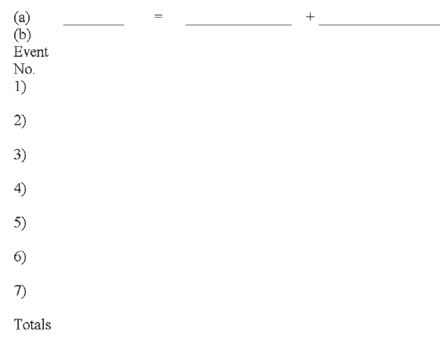The transactions listed below apply to Lovell Company for its first year in business. Assume that all transactions involve the receipt or payment of cash.
Transactions for the year 2012:
1) Issued common stock to investors for $15,000 cash.
2) Borrowed $8,000 from the local bank.
3) Provided services to customers for $18,000.
4) Paid expenses amounting to $11,400.
5) Purchased a plot of land costing $12,000.
6) Paid a dividend of $6,000 to its stockholders.
7) Repaid $4,000 of the loan listed in item 2.
Required:
(a) Fill in the headings to the accounting equation shown below.
(b) Show the effects of the above transactions on the accounting equation. 
Definitions:
Milgram Experiments
The Milgram Experiments were a series of psychological experiments conducted by Stanley Milgram in the 1960s to measure the willingness of participants to obey an authority figure who instructed them to perform acts conflicting with their personal conscience.
Social Facilitation
The tendency for people to perform differently when in the presence of others than when alone, typically showing improved performance on tasks.
Fishing Reel
A device attached to a fishing rod used to wind and stow the fishing line, facilitating casting and retrieval of the lure or bait.
Group Polarization
The tendency for a group to make decisions that are more extreme than the initial inclination of its members, often observed after group discussions.
Q9: Which of the following best describes what
Q13: A person suffering from depression thinks about
Q22: Product costs are also referred to as<br>A)
Q25: As of May 31, 2014, the
Q38: "IASB" stands for<br>A) Internal Accounting Standards Board.<br>B)
Q43: Houston Company began business operations and experienced
Q70: The transactions listed below apply to Lovell
Q88: Fill in the blanks indicated by
Q97: When a "debit memo" is included in
Q162: Which of the following is NOT an